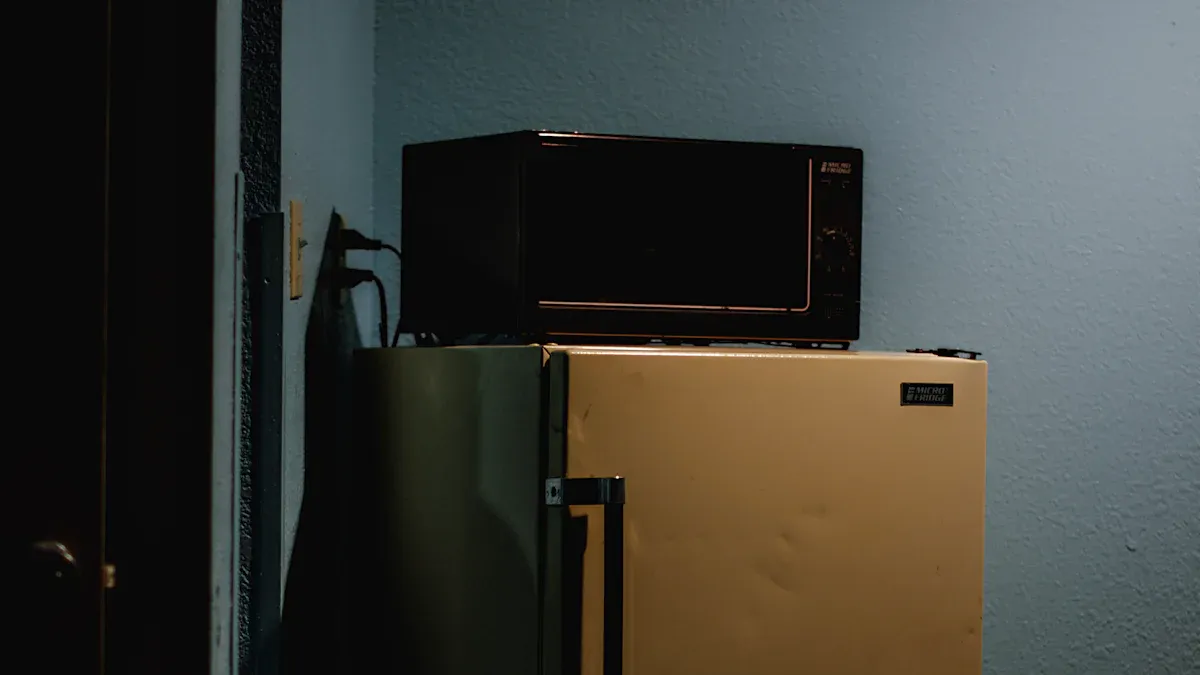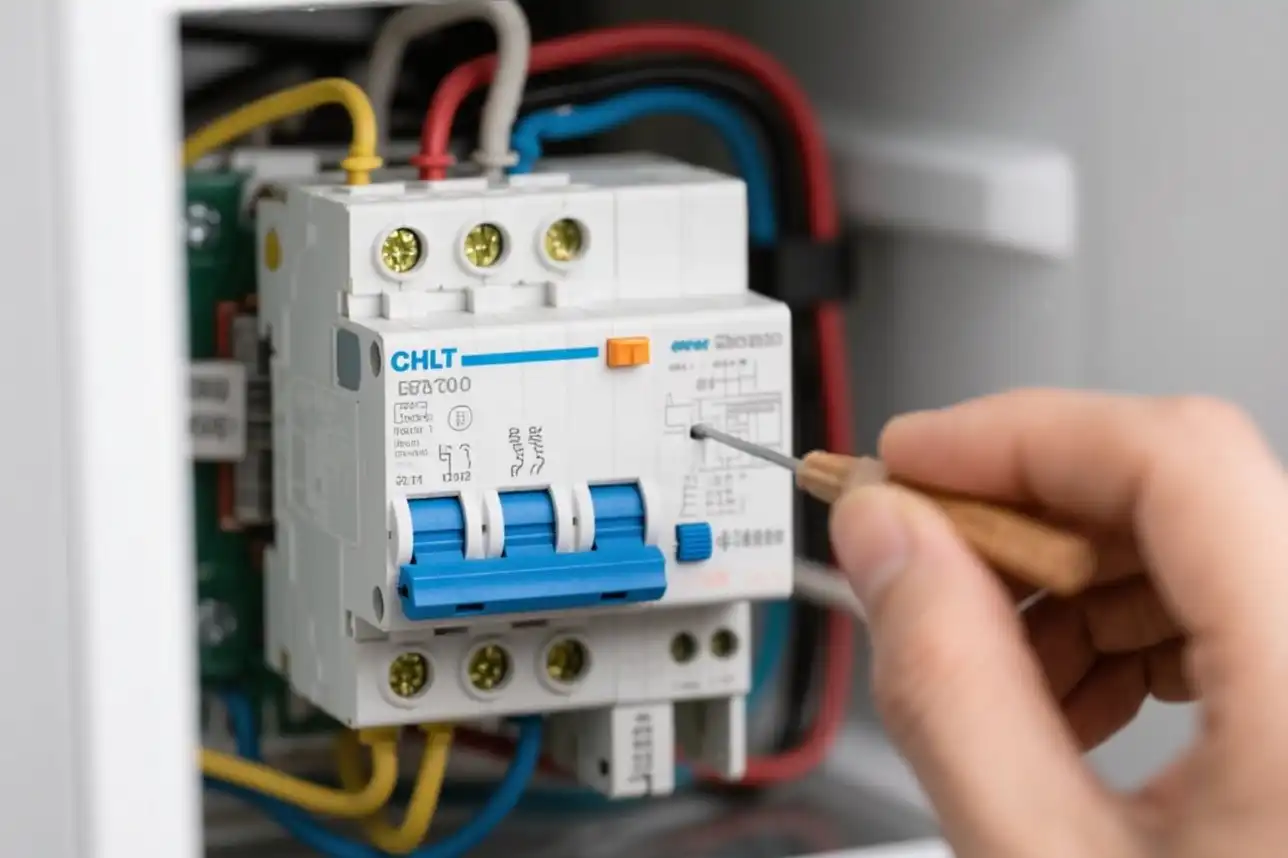You may feel frustrated when your refrigerator suddenly shuts off and the refrigerator trip circuit breaker trips. This problem can happen in any home. Sometimes, a simple issue like a dirty coil or a loose plug causes the trouble. Always put your safety first. Turn off the power before you check anything. Take your time and follow each step carefully to find the cause.
Key Takeaways
- Always unplug your refrigerator and turn off the power first. This helps you stay safe when checking for problems.
- Breaker trips can happen for many reasons. These include electrical overload, short circuits, bad outlets, or problems inside the fridge.
- Plug another appliance into the outlet to test it. This helps you see if the problem is with the fridge or the power supply.
- Clean the condenser coils often. Check the power cord and outlet for any damage. This can help stop overloads.
- If the breaker keeps tripping, stop using the fridge. Also stop if you see sparks, smell burning, or hear buzzing. Call a professional for help.
Common Causes

Electrical Overload
You might see your refrigerator trip circuit breaker if the fridge uses too much power. This is called an electrical overload. Some signs can help you spot this problem:
- The breaker keeps tripping after you reset it.
- You notice burn marks or sparks near the outlet.
- The power cord looks broken or wires are showing.
- The compressor clicks, which could mean the start capacitor is bad and causing overload.
- The outlet feels hot or the prongs look old.
Tip: Plug your refrigerator into its own outlet. If you use the same circuit for other things, it can overload and trip the breaker.
Short Circuit
A short circuit happens when wires touch each other or touch metal inside the fridge. This makes a lot of electricity move fast, so the breaker trips right away. You might hear a pop or see a spark. If this happens, unplug the fridge and do not use the outlet until you check it or get help from a professional.
Faulty Outlet or Wiring
Sometimes the problem is not the fridge but the outlet or wiring. Loose or broken wires can make sparks and get too hot. If you see burn marks, melted plastic, or smell burning, stop using the outlet. Old or worn outlets can also cause the refrigerator trip circuit breaker problem.
Internal Refrigerator Faults
Some problems inside the fridge can make the breaker trip. The most common are:
- A bad defrost heater, which can trip the breaker when the fridge starts to defrost. These trips can seem random.
- The compressor can leak a little electricity, which can make sensitive breakers or GFCI outlets trip.
- These problems usually happen sometimes, not every time you use the fridge.
Note: It is hard to find these inside problems without special tools. If you think there is an inside problem, call a professional for help.
Refrigerator Trip Circuit Breaker Troubleshooting
If you have a refrigerator trip circuit breaker problem, you must be careful and safe. There are steps you can follow to find out what is wrong and decide if you can fix it or need help.
Test with Another Appliance
First, unplug your refrigerator. Then, plug in something else, like a lamp or toaster, into the same outlet. If the other thing works and the breaker does not trip, your refrigerator might have a problem inside. If the breaker trips again, the outlet or the circuit could be the problem. Use a voltage tester or multimeter to check if the outlet gives the right voltage, which should be between 110 and 120 volts. If you feel shocks, see sparks, or the other thing does not work, stop and call an electrician.
Tip: This test helps you figure out if the refrigerator trip circuit breaker issue is from the refrigerator or the electrical supply.
Inspect the Breaker and Outlet
Next, look at the breaker and outlet for any trouble. Check for burn marks, melted plastic, or a burning smell near the outlet. See if the outlet feels loose or if the plug does not fit tightly. Use a multimeter to check the outlet voltage. It should show between 110 and 120 volts. If you see sparks, burning, or melted parts, do not use the outlet. These are signs that the outlet or breaker is bad. If your home has a GFCI outlet, it might trip because of water or grounding problems.
Alert: Never reset a breaker more than once if it keeps tripping. This is not safe. If the breaker feels hot or makes a buzzing noise, call an electrician right away.
Check Refrigerator Power Cord
A broken power cord can cause a refrigerator trip circuit breaker. Unplug the refrigerator and reset the breaker before you look at the cord. Look for damage like color changes, melting, or wires showing. Make sure the prongs are not loose or worn. If you see any damage, get a new cord from the original maker. If the breaker trips right after you plug in the refrigerator, the problem might be inside the fridge.
Note: Never use a broken cord. If you do not know how to replace it, ask a professional for help.
Clean Condenser Coils
Dirty condenser coils can make your refrigerator work too hard and use more power. This can cause a refrigerator trip circuit breaker. Unplug the refrigerator before you clean. Find the condenser coils, which are usually at the back or under the fridge. Use a vacuum or coil brush to clean off dust, dirt, and pet hair. Clean the coils every six months, or more if you have pets or lots of dust.
Tip: Clean coils help your refrigerator work better and stop electrical overloads.
Examine Compressor and Components
The compressor and its parts, like the start relay and capacitor, can make the breaker trip if they break. Unplug the refrigerator and take off the back panel to see the compressor. Listen for strange sounds. A good compressor makes a quiet hum. If you hear rattling or clicking, the start relay or capacitor might be bad. Use a multimeter to check the start relay and capacitor for continuity. If the capacitor looks swollen or leaks, replace it. If you unplug the compressor and the breaker stops tripping, the compressor could be the problem. Only check or change these parts if you know how and have the right tools.
Safety Reminder: Always wear insulated gloves and safety glasses when working with electrical parts. If you are not sure about any step, stop and call a professional technician.
By following these steps, you can often find out why you have a refrigerator trip circuit breaker. Remember, safety is most important. If you cannot find the problem or the breaker keeps tripping, call an electrician or appliance repair technician.
When to Call a Professional
Persistent Breaker Trips
If your refrigerator keeps making the breaker trip, do not ignore it. This usually means there is a big problem. You might notice some warning signs:
- The breaker trips again and again after you reset it.
- You smell burning near the outlet or breaker panel.
- The outlet or breaker panel feels hot to touch.
- You hear buzzing or humming from the panel.
- Lights flicker or get dim when the refrigerator runs.
- You see sparks or burn marks around outlets.
These signs can mean you have too much power on one circuit, bad wiring, or a broken breaker. If you see any of these, stop using the refrigerator and call an electrician. Ignoring these problems can cause fires or damage your house.
Electrical or Wiring Issues
Sometimes, the problem is not inside the refrigerator but in your home’s wiring. You might see lights flicker, smell burning, or see sparks when you plug in the fridge. These problems often mean you have loose wires, old outlets, or a bad breaker. Electricians often find broken wires or bad control panels during repairs. If you notice these signs, do not try to fix them yourself. Electricians have the right tools and know how to fix these problems safely.
Alert: If you see sparks, smell burning, or hear buzzing from outlets, unplug the refrigerator right away and call a professional.
Compressor or Internal Faults
Some problems inside the refrigerator, like a bad compressor or start relay, can cause the refrigerator trip circuit breaker issue. These problems are harder to fix and cost more than simple repairs. Compressor problems use a lot of power and can trip the breaker because of hard starts or shorted wires. If you hear loud clicks, rattles, or the fridge will not start, you need a technician. Sometimes, fixing a compressor costs so much that buying a new refrigerator is better. Always let a professional check and repair these parts to keep your home safe.
You can fix your refrigerator safely by doing these things:
- Make sure the refrigerator is plugged in and the breaker works.
- Check the thermostat settings and clean the condenser coils.
- See if vents are blocked and look at the door seals.
- Use a special outlet just for the refrigerator and do not plug in too many things.
Always unplug the refrigerator before you try to fix it. If the problem does not go away or you think there is an electrical problem, call a trained technician. Doing regular checkups can stop problems and help your refrigerator work safely.
FAQ
What should you do first if your refrigerator trips the breaker?
Unplug your refrigerator right away. Reset the breaker. Plug in another small appliance to test the outlet. If the breaker trips again, you may have a wiring or outlet problem.
Can a refrigerator trip a breaker if the coils are dirty?
Yes. Dirty condenser coils make your refrigerator work harder. This can cause it to use more power and trip the breaker. Clean the coils every six months to help prevent this.
Is it safe to keep resetting a tripped breaker?
Alert:
No. If the breaker keeps tripping, stop resetting it. This can be dangerous. Call a professional to check for electrical problems.
Why does my refrigerator only trip the breaker sometimes?
You may have an internal fault, like a bad defrost heater or compressor. These problems can cause random trips. You should have a technician check your refrigerator if this happens.
See also
Why a bad circuit breaker can cause low voltage
How to Identify and Fix Air Circuit Breaker Malfunctions
Step-by-Step Guide to Replacing Miniature Circuit Breakers
How to Diagnose Micro Circuit Breaker Malfunction in Your Home
What Are the Signs of a Bad Circuit Breaker

.Refrigerator-trip-circuit-breaker-troubleshooting-and-repair-1024x682.webp)


